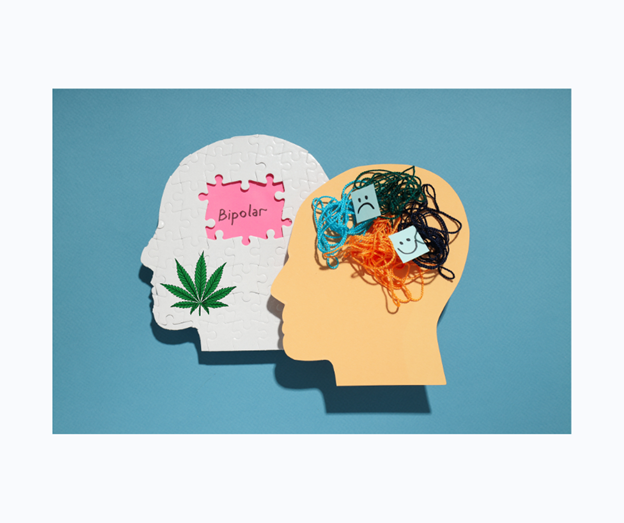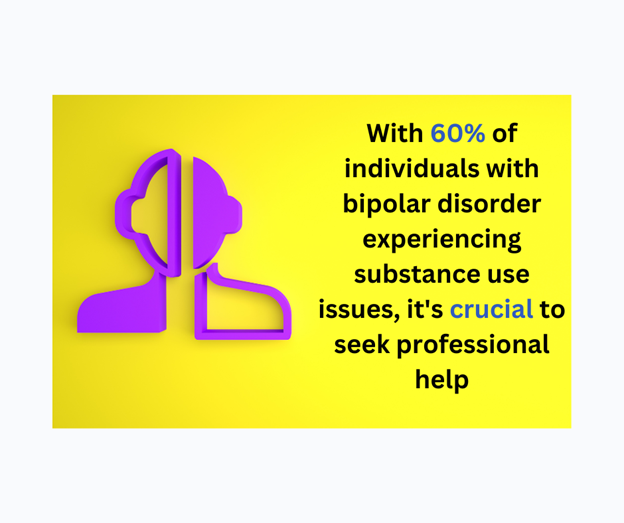Living with bipolar disorder and marijuana use can be a challenging combination. Did you know that individuals with bipolar disorder are seven times more likely to use cannabis than those without the condition? If you’re struggling with this dual diagnosis, you’re not alone. At Archway Behavioral Health, we offer a range of evidence-based therapies to help you manage both issues effectively. From Cognitive Behavioral Therapy (CBT) and Dialectical Behavior Therapy (DBT) to EMDR and trauma-focused approaches, our experienced clinicians tailor treatment to your unique needs. Whether you require one-on-one sessions, group therapy, or more intensive options like partial hospitalization programs (PHPs) or intensive outpatient programs (IOPs), we’re here to support your journey towards stability and recovery. Take the step toward reclaiming your life and health—contact us at (888) 488-4103.
What is Bipolar Disorder?
Bipolar disorder is a chronic mental health condition characterized by extreme mood swings. It causes unusual shifts in a person’s mood, energy, activity levels, and ability to function.
Main Types
- Bipolar I: Defined by manic episodes lasting at least 7 days and depressive episodes of at least 2 weeks.
- Bipolar II: A pattern of depressive episodes and less severe hypomanic episodes.
- Cyclothymic Disorder: Recurring hypomanic and depressive symptoms that don’t qualify as full episodes.
Symptoms
The primary symptoms involve periods of mania (feeling very high, energized, irritable) alternating with depression (feeling very low, hopeless, unable to complete daily tasks). Some may experience mixed episodes with both manic and depressive symptoms simultaneously.
Causes & Risk Factors
While the exact cause is unknown, bipolar disorder likely results from differences in brain structure/functioning combined with genetic and environmental factors like trauma or stress. Having a close relative with bipolar disorder increases one’s risk.
The Connection Between Bipolar Disorder and Marijuana Use
Prevalence of Use
Cannabis is the most commonly abused substance among individuals with bipolar disorder, with around 70% using it and 30% meeting the criteria for cannabis use disorder. There appears to be a complex relationship between marijuana use and bipolar symptoms.
Impact on Symptoms
While some patients report using marijuana to temporarily relieve manic or depressive episodes, research indicates it can ultimately worsen the occurrence of mania and increase the risk of new manic symptoms. Marijuana use may also intensify depressive states, anxiety, and impair cognitive functions like memory and attention which are already affected in bipolar disorder.
Increased Risks
Regular marijuana use is associated with increased symptoms of mania and hypomania in bipolar patients. It can lead to rapid cycling between mood states, psychotic episodes (especially with a family history), and may increase suicidality risks. Combining marijuana with bipolar disorder also raises the risk of other co-occurring substance abuse and personality disorders.
Treatment Implications
Marijuana use can interfere with metabolism of bipolar medications, making symptom management more difficult. While research is ongoing into potential endocannabinoid system targets, self-medicating with marijuana is not recommended as it can worsen bipolar disorder symptoms and treatment outcomes long-term.
Effective Therapies for Treating Bipolar Disorder
Psychotherapy Approaches
With 60% of individuals with bipolar disorder experiencing substance use issues, it’s crucial to seek professional help. Several evidence-based psychotherapy approaches have proven effective for managing bipolar disorder. Cognitive behavioral therapy (CBT) helps patients identify and change negative thought patterns that can trigger mood episodes. Dialectical behavior therapy (DBT) teaches skills to regulate intense emotions and improve relationships.
EMDR and Trauma Therapy
Eye movement desensitization and reprocessing (EMDR) therapy can help process traumatic memories contributing to bipolar symptoms. Archway Behavioral Helath offers EMDR along with specialized trauma therapy for patients with co-occurring PTSD.
Comprehensive Treatment Programs
For more intensive treatment, partial hospitalization programs (PHPs) and intensive outpatient programs (IOPs) provide structured daily therapy. Facilities like Archway Mental Health utilize a multi-disciplinary team approach with individual, group, and family therapies tailored to each patient’s needs.
Intensive Outpatient Programs (IOPs) for Bipolar Disorder Treatment
Comprehensive Care
Intensive outpatient programs (IOPs) provide a comprehensive, evidence-based treatment approach for managing bipolar disorder. These programs offer a similar level of support as inpatient rehab, but with the flexibility to continue daily responsibilities like work or school.
Tailored Treatment
IOPs deliver highly individualized care, with treatment plans tailored to each patient’s needs, goals, and availability. Services may include individual therapy, group counseling, family sessions, and medication management, all delivered by a multidisciplinary team.
Structured Support
Unlike traditional outpatient therapy, IOPs provide a structured treatment schedule with several hours of programming each week. This structured environment, coupled with group support, can reinforce coping strategies and skills for managing bipolar symptoms in daily life.
Transition and Maintenance
IOPs can serve as a transitional program after completing inpatient care, offering continued support and structure. For others, an IOP may be an appropriate initial treatment approach, providing more intensive services than weekly therapy sessions alone.
Partial Hospitalization Programs (PHPs) for Treating Bipolar Disorder
Intensive Support
Partial Hospitalization Programs (PHPs) offer intensive, structured outpatient treatment for bipolar disorder. These programs provide a comprehensive approach beyond just managing mood episodes, aiming to prevent future crises by addressing underlying factors like medication non-compliance, negative thought patterns, substance abuse, and past trauma. PHPs involve several hours of therapy daily, multiple days per week.
Comprehensive Care
A PHP typically includes individual therapy, group counseling, family therapy, cognitive behavioral therapy (CBT), dialectical behavior therapy (DBT), and other evidence-based modalities. Additional services like nutritional assessment, acupuncture, yoga, and recreational activities promote holistic well-being. This intensive, multifaceted approach equips you with tools to cope with stressors and resolve mood triggers long-term.
Flexible Outpatient Setting
Unlike inpatient treatment, PHPs allow you to continue daily responsibilities like work, school, or family commitments while receiving high-level care. They provide a step-down option after hospitalization, offering more support than standard outpatient therapy to aid your transition and prevent relapse. This flexibility, combined with the program’s structure and routine, helps regulate sleep, energy levels, and impulsive behaviors.
Conclusion
In conclusion, managing bipolar disorder alongside marijuana use requires a comprehensive approach. Archway Behavioral Health offers evidence-based therapies like CBT, DBT, and EMDR, which can effectively address both conditions simultaneously. These therapies, combined with trauma-focused treatments and group sessions, provide a solid foundation for recovery. For those requiring more intensive care, partial hospitalization programs (PHPs) and intensive outpatient programs (IOPs) offer structured support. By utilizing these resources and committing to your mental health journey, you can achieve stability, reduce substance use, and improve your overall quality of life.Take the step toward reclaiming your life and health—contact us at (888) 488-4103.



